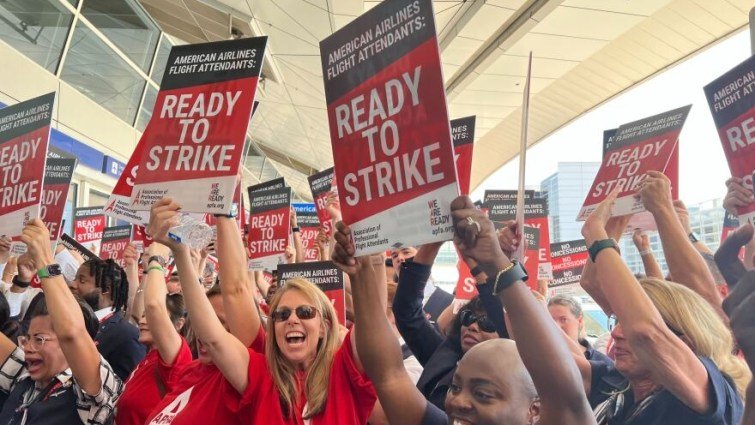Union’s Resounding Decision
Members of the Association of Professional Flight Attendants (APFA), the union representing American Airlines (AA) flight attendants, have made a resounding statement. In a nearly unanimous vote, they authorized a strike in the event of failed contract negotiations with AA’s management.

Union President’s Strong Words
Julie Hedrick, the national president of APFA, delivered a strong message. Emphasizing the flight attendants’ determination “We are fired up and ready for a contract. They take a risk by ignoring this strike vote. It is important to acknowledge and value the contributions we have made to American Airlines’ success.
Pilot’s Recent Contract Ratification
In contrast, AA pilots had recently voted to ratify a new and tentative four-year contract with management, a deal valued at approximately $9 billion. This agreement, reached on August 1, included an impressive 21% pay hike.
Flight Attendants’ Turn
However, the APFA contends that the pilots’ agreement provided for a total of 46% wage increases throughout their contract. Flight attendants are now asserting, “It’s our turn, and we are ready.”
Demands on the Table
The APFA, representing over 26,000 AA flight attendants, is advocating for wage increases and additional provisions such as boarding pay, as well as enhancements to their 401(k) plan and profit-sharing benefits.
Management’s Perspective
American Airlines responded to the situation with a commitment to ongoing negotiations, stating, “We understand that a strike authorization vote is one of the important ways flight attendants express their desire to get a deal done. The outcomes don’t alter our commitment or stop us from moving quickly to get to a consensus.
Overwhelming Support for Strike Authorization
More than 93% of eligible flight attendants participated in the vote, with an astounding 99.47% in favor of authorizing a strike, according to APFA. This mandate empowers the union’s negotiations team to return to the bargaining table with a clear message to management.
Legal Hurdles Ahead
While the vote is the union’s ability to strike is subject to regulatory processes. The APFA filed with the federal National Mediation Board (NMB) in April, and they can only strike once the NMB releases them from mediation, following a mandatory 30-day cooling-off period.
Warning of Future Action
The APFA concluded with a strong stance, stating, “But if management continues proposing concessions coupled with meager improvements to compensation and retirement, we will not hesitate to request a release (from the NMB) to strike if necessary.” The stage is set for a potentially turbulent chapter in labor relations within American Airlines.




